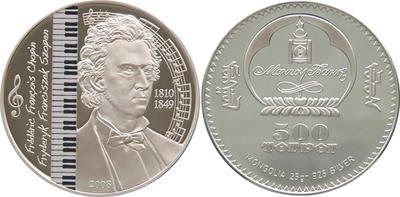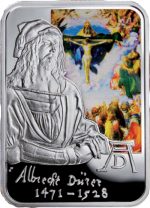Mongolia – 2008 – 500 Tugrik – Frederic Chopin (silver color) (PROOF)
€ 49.95
ONLY 1000 PIECES OF WHICH MOST ONLY IN SETS WITH GOLD!
In stock / on backorder
Description
25 gram .925 silver, 36mm, 1000 (!!) pieces
Frédéric Chopin (Polish: Fryderyk [Franciszek] Chopin, sometimes Szopen; French: Frédéric [François] Chopin; surname pronunciation in English: IPA: /ˈʃoʊpæn/ and French: French pronunciation: [ʃɔpɛ̃]) March 1, 1810[1] ? October 17, 1849) was a Polish[2][3] composer and virtuoso pianist of the Romantic period. He is widely regarded as the greatest Polish composer, and ranks as one of music’s greatest tone poets.[4]
He was born in the village of Żelazowa Wola, in the Duchy of Warsaw, to a Polish mother and French-expatriate father, and in his early life was regarded as a child-prodigy pianist. In November 1830, at the age of 20, Chopin went abroad; following the suppression of the Polish November Uprising of 1830?31, he became one of many expatriates of the Polish Great Emigration.
In Paris, he made a comfortable living as a composer and piano teacher, while giving few public performances. A Polish patriot,[5][6] in France he used the French versions of his names and eventually, to avoid having to rely on Imperial Russian documents, became a French citizen.[7][8][9] After some ill-fated romantic involvements with Polish women, from 1837 to 1847 he conducted a turbulent relationship with the French writer George Sand (Aurore Dudevant). Always in frail health, in 1849 he died in Paris, at the age of 39, of chronic pulmonary tuberculosis.[10][11]
Chopin’s extant compositions were written primarily for the piano as a solo instrument. Though technically demanding, Chopin’s style emphasizes nuance and expressive depth rather than virtuosity. Chopin invented musical forms such as the ballade[12] and was responsible for major innovations in forms such as the piano sonata, waltz, nocturne, étude, impromptu and prelude. His works are mainstays of Romanticism in 19th-century classical music.
(source wiki pedia)





